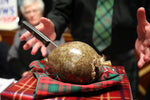
The History of ‘Address to a Haggis’ by Robert Burns
, 3 min reading time

, 3 min reading time
Robert Burns’ ‘Address to a Haggis’ was first published in 1786 and has become the highlight of Burns Night celebrations worldwide. Whether written at a grand Edinburgh dinner or inspired by a humble workshop visit, its playful praise of Scotland’s national dish still captures the spirit of the occasion today
Robert Burns’ famous poem ‘Address to a Haggis’ has become one of the most recognisable parts of a Burns Supper. First published in The Caledonian Mercury on December 20, 1786, it celebrates Scotland’s national dish with humour, pride, and theatrical flair. But the story of how it came to be is surrounded by legend.
There are two popular tales of how Burns came to write his famous address.
The Edinburgh Dinner Party – According to one version, Burns had recently arrived in Edinburgh when he was invited to dine at the home of a wealthy merchant, Andrew Bruce. To entertain the host and guests, Burns composed and performed the poem in honour of the haggis being served that evening.
The Cabinetmaker’s Workshop – A more charming account suggests that Burns was visiting his friend, cabinetmaker John Morrison, when he saw a particularly fine haggis. Inspired by the sight, he is said to have composed the poem on the spot.
In the late 1700s, haggis was considered a special-occasion delicacy, not the everyday dish we think of today. Some historians believe Burns’ tribute might have carried a subtle political edge, poking fun at those who treated haggis as an exclusive luxury.
Whatever its true beginnings, Address to a Haggis has stood the test of time. Today, it’s performed in settings ranging from family gatherings to grand Burns Suppers in prestigious venues such as the National Museum of Scotland. Even lifestyle magazines like Tatler publish guides to the best places to hear it recited on Burns Night.
From playful school performances to formal bagpiper-led ceremonies, every recital is unique – something Burns himself would no doubt have appreciated.
(Original Scots text as written in 1786)
Fair fa’ your honest, sonsie face,
Great chieftain o’ the pudding-race!
Aboon them a’ ye tak your place,
Painch, tripe, or thairm:
Weel are ye wordy o’ a grace
As lang’s my arm.
The groaning trencher there ye fill,
Your hurdies like a distant hill,
Your pin wad help to mend a mill
In time o’ need,
While thro’ your pores the dews distil
Like amber bead.
An’ cut you up wi’ ready sleight,
Trenching your gushing entrails bright,
Like ony ditch;
And then, O what a glorious sight,
Warm-reekin’, rich!
Then, horn for horn, they stretch an’ strive:
Deil tak the hindmost! on they drive,
Till a’ their weel-swall’d kytes belyve
Are bent like drums;
Then auld Guidman, maist like to rive,
Bethankit! hums.
Is there that owre his French ragout
Or olio that wad staw a sow,
Or fricassee wad make her spew
Wi’ perfect sconner,
Looks down wi’ sneering, scornfu’ view
On sic a dinner?
Poor devil! see him owre his trash,
As feckless as wither’d rash,
His spindle shank, a guid whip-lash;
His nieve a nit;
Thro’ bloody flood or field to dash,
O how unfit!
But mark the Rustic, haggis-fed,
The trembling earth resounds his tread.
Clap in his walie nieve a blade,
He’ll mak it whissle;
An’ legs an’ arms, an’ heads will sned,
Like taps o’ thrissle.
Ye Pow’rs, wha mak mankind your care,
And dish them out their bill o’ fare,
Auld Scotland wants nae skinking ware
That jaups in luggies;
But, if ye wish her gratefu’ prayer
Gie her a haggis!